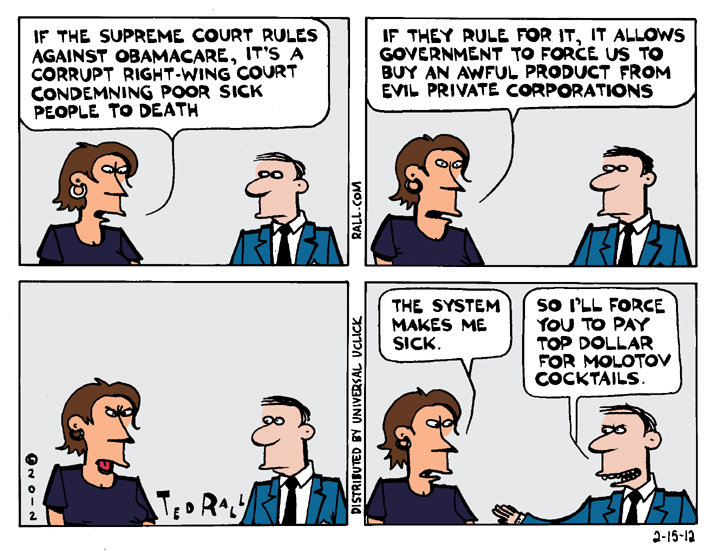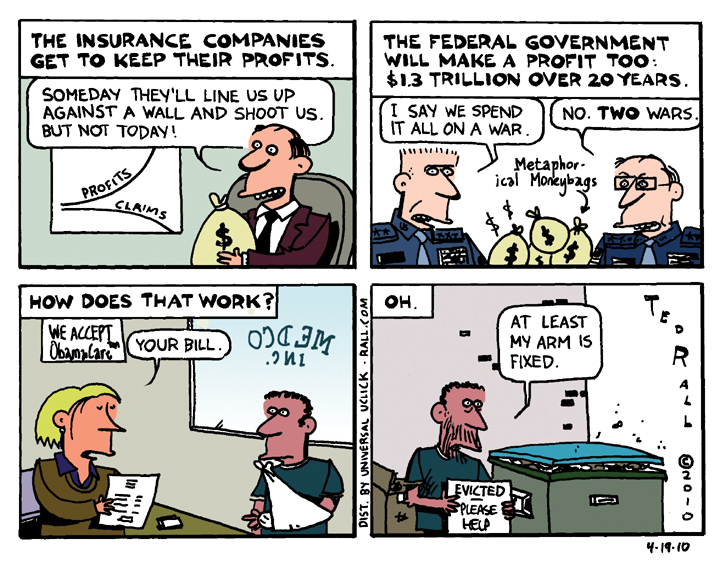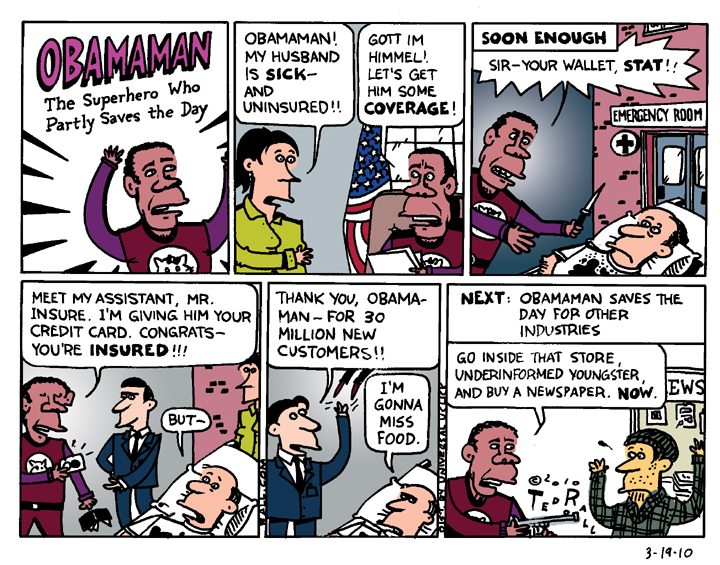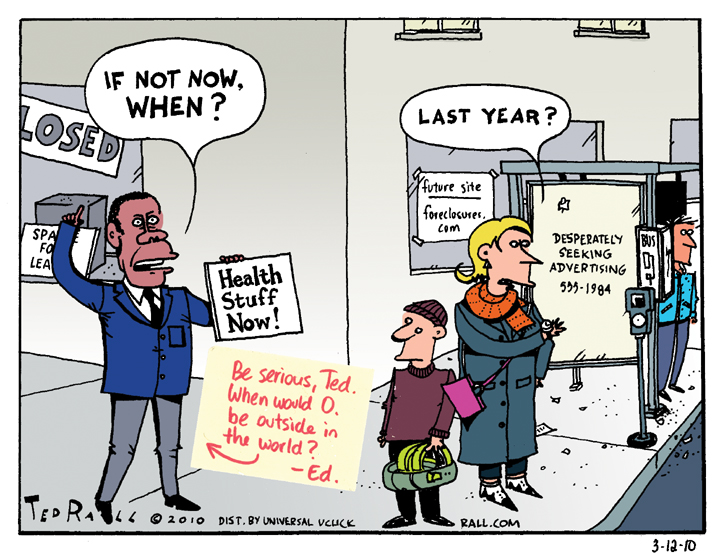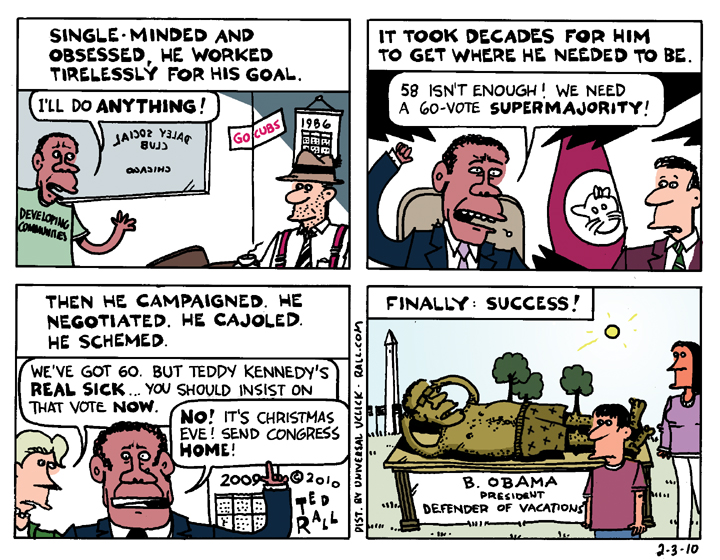Political Malpractice and Missed Opportunities under Obama
I’m on book tour, promoting “The Book of Obama: How We Went From Hope and Change to the Age of Revolt.”
In “The Book of Obama” I argue that Obama is America’s Mikhael Gorbachev. Like Gorby, The One (Oprah’s phrase) is the most progressive, decent and intelligent leader his system is willing and able to allow to rise to power; like the reformist of perestroika, Obama’s fundamental not-so-badness—coupled with his…ineffectiveness? cluelessness? conservatism? exposes the fact that the system is the problem. That voting for a better/less evil leader can’t bring about the changes we need, because what the 99% view as problems—unemployment, underemployment, the growing gap between rich and poor—are things that the system views as not merely desirable, but necessary. Its raison d’être.
Among progressives it’s a given that Obama has been a disappointment. At my signings people keep asking me: Why? Why hasn’t the president lived up to the hopes and dreams we invested in him? Sure, the Republicans have blocked him at every turn. But he doesn’t seem to try.
Why not? Is he a wimp? Or were liberals wrong about him—was Obama an establishment conservative from the start?
I don’t know what’s in Obama’s heart. Frankly, I don’t care. It’s all about policies: either you’re for good policies, or you’re not. If you are, you fight for them with everything you’ve got. If not…
Like most pundits, I tend to focus on the negative. So this week let’s look at Obama’s signature accomplishments, the things he actually did get done: healthcare reform, his statement support for gay marriage, and last week’s Dream Act Lite, his order that Department of Homeland Security stop pursuing the approximately 800,000 young people who were brought to the U.S. illegally.
It took three years for this President to do something that brought a smile to my face. So I owe him this: Nicely done, Mr. President. (Sure, it’s just a political ploy, a play for the Hispanic vote. But other things Obama should do, but won’t—unlimited unemployment benefits, assistance for foreclosure victims, a new WPA—would be popular too. Pandering to the people is called democracy.)
Millions of people—the lucky 800,000, their families and friends—finally have their foot in the door. Early signals from GOP bosses indicate reluctance, even if they win this fall, to revert to the bad old days of rounding up kids and deporting them to “homes” they don’t know, whose languages they don’t speak.
Yet, like so many of his more positive acts, it came later than it should. And it should have been built to last.
The Dream Act failed in December 2010, just after the Republican sweep in the Congressional midterms. It would have passed if not for the craven, bigoted “nay” votes of five Democratic senators spooked by the election results.
I keep thinking back to 2009. Democrats had both houses of Congress. A filibuster-proof majority in the Senate. Obama enjoyed a worshipful media. Sky-high public opinion polls. Why didn’t the president propose the Dream Act then, when it would probably have passed, sparing 800,000 kids terrible uncertainty—not to mention those who got swept up during the last three years? (While we’re at it: what’s the point of letting kids stay in the U.S. and deporting their parents?
Back in 2009, was Team Obama guilty of political ineptitude? Obsessive focus on healthcare? We don’t know. The result of their neglect of young immigrants amounted to political malpractice at least, bigotry at worst. (There were, after all, more deportations of illegals under Obama than under Bush.)
Worse than too little and/or too late, Obama’s announcement in support of gay marriage came so late that it might as well not have happened at all; by the time he spoke out, gay marriage had become a historical inevitability. Talk about political malpractice! What is more ineffectual than irrelevance? Like the Homeland Security directive on illegals, it came as big, good news to millions of people. But it could have been handled earlier, proactively, and—not incidentally—paying bigger dividends to the president’s reelection effort.
Less clear but with broader implications was healthcare reform. “Have you had enough of Obamacare?” Tim Pawlenty asked a crowd at a pro-Mitt Romney rally. “Yes!” they shouted. But there is no Obamacare. Not yet. Even if the Supreme Court doesn’t overturn the Administration’s biggest achievement, it doesn’t go into effect until 2014. After, perhaps, President Romney takes office. What was Obama thinking? If nothing else, wasn’t he worried about his historical legacy?
My guess is that he cares less about his legacy, or changing things, than the political horse race. He likes winning as an individual more than he cares about changing the world.
Obama has a few chances left to prove me wrong. He could still close Gitmo by executive order. He could also propose a federal law legalizing abortion, forcing the GOP to counter the 77 percent of Americans who told the most recent Gallup poll that they’re pro-choice. It would be a bold move, one that would resolve the decades-long legal limbo that has left abortion rights in the hands of the Supreme Court. Is Obama incapable of bravery? Of vision? Or is he using the threat of a Romney SCOTUS to threaten women into voting for him?
No one knows.
All we can do is consider the president’s actions.
(Ted Rall’s new book is “The Book of Obama: How We Went From Hope and Change to the Age of Revolt.” His website is tedrall.com. This column originally appeared at MSNBC.com)
(C) 2012 TED RALL, ALL RIGHTS RESERVED.

